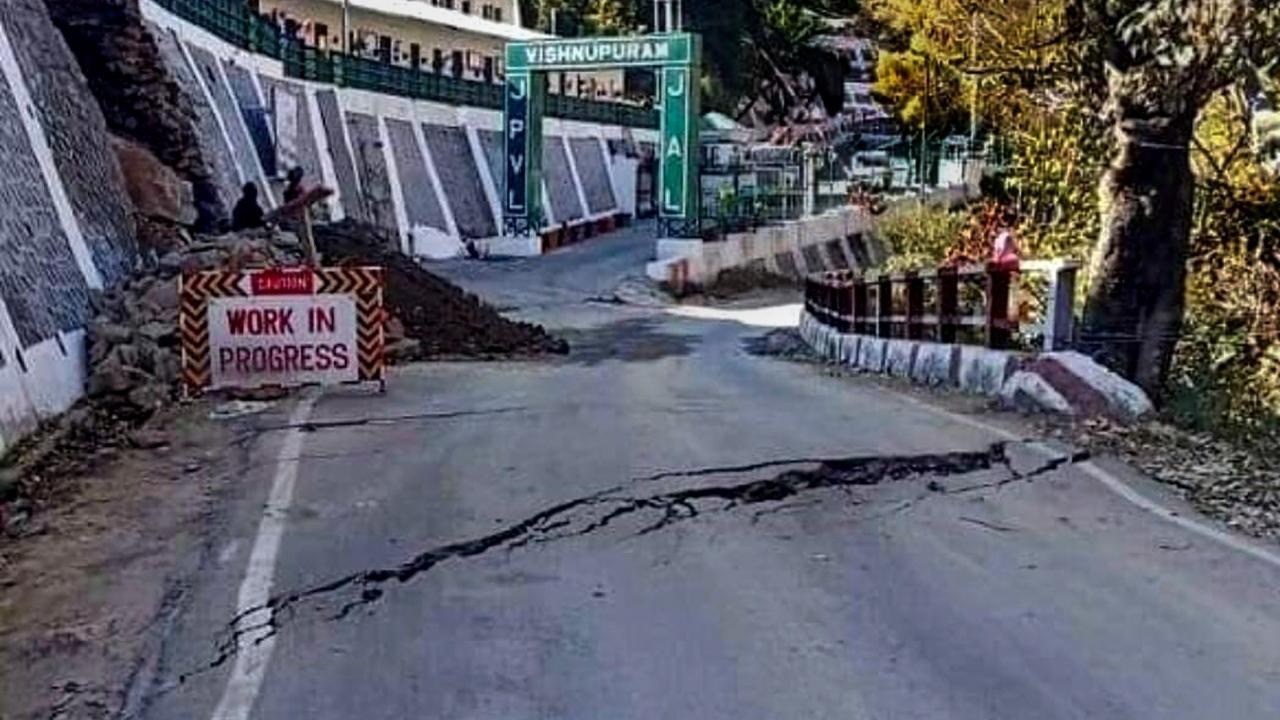Earth Sciences Minister Jitendra Singh made the announcement at the India-UK Workshop of Geosciences here and said the observation systems will be in place by January 11.

Cracks appear in the houses and on the roads due to landslides at the Joshimath. Pic/ PTI
The Centre on Tuesday announced that it will install micro seismic observation systems at Joshimath--the gradually sinking Himalayan town in Uttarakhand.
ADVERTISEMENT
Earth Sciences Minister Jitendra Singh made the announcement at the India-UK Workshop of Geosciences here and said the observation systems will be in place by Wednesday.
Addressing the workshop, he said there was a critical need for fundamental research on the physical processes that lead to failure of the brittle layers beneath the crust and sub-crust.
The minister noted that human consequences of natural disasters in India were rising rapidly and stressed on the need to devise proper mitigation strategies.
Singh said the Ministry of Earth Sciences had established 37 new seismological centres in the last two years for extensive observation facilities, generating a huge database for outcome-oriented analytics.
He said in the next five years, 100 more such seismological centres will be opened across the country for improving real time data monitoring and data collection.
Officials said seismic microzonation study for the area would generate risk resilient parameters for safer dwellings and infrastructure.
They said Joshimath falls under the highest seismic hazard Zone V as it experiences continuous seismogenic stresses.
Also read: After Joshimath, cracks appear in houses in Uttarakhand's Karnprayag; people seek govt help
Seismic energy generation due to micro-earthquakes may have weakened the strength of the rocks as Joshimath is located in the earthquake rupture zone of the 1999 Chamoli earthquake, they said.
Climatic factors such as excessive precipitation and flow of water from mountains into massive cracks and fractures in the sub-surface rocks lead to widening of cracks and hastening the slip in rock material, the officials said.
Addressing the workshop, Singh said scientific understanding of the processes behind disasters has grown immensely over the past 50 years, and there is a need for strengthening further international collaborations like the Indo-UK initiative to fight such disasters.
He also added that scientific understanding of the processes behind disasters has grown immensely over the past 50 years, and there was a need for strengthening further international collaborations like the Indo-UK initiative to fight such disasters in future.
The two-day workshop was attended by British High Commissioner Alex Ellis; Wendy Matcham, Head, Natural Environment Research Council (NERC), UK Research and Innovation (UKRI); O P Mishra, Director, National Centre for Seismology and Sukanya Kumar, Acting Director, UK Research and Innovation India.
This story has been sourced from a third party syndicated feed, agencies. Mid-day accepts no responsibility or liability for its dependability, trustworthiness, reliability and data of the text. Mid-day management/mid-day.com reserves the sole right to alter, delete or remove (without notice) the content in its absolute discretion for any reason whatsoever.
 Subscribe today by clicking the link and stay updated with the latest news!" Click here!
Subscribe today by clicking the link and stay updated with the latest news!" Click here!







